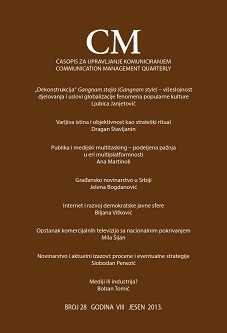Internet i razvoj demokratske javne sfere
Internet and Democratic Public Sphere Development
Author(s): Biljana VitkovićSubject(s): Media studies, Theory of Communication, Social Informatics, Sociology of Politics
Published by: Fakultet političkih nauka Univerziteta u Beogradu
Keywords: Internet; new media; public sphere; democracy; media specialization; audience fragmentation; public space reduction; deterritorialization of public life;
Summary/Abstract: Internet, social networks, mobile video devices and non-standard media enable to a great number of people to connect to each other, and depending on the similarity of interests or topics they are interested in, they can talk to each other, discuss on the issues of power and principles at the national, supranational and global level supporting an idea or a candidate. In the communication channels changed this way, the Internet presents a field of communication – politically construed space which is not directly connected with a physical territory – within which new types of social relations of power are established among its users. The question related to the structure, dimensions and political implications of the public sphere on the Internet is thus in the focus. At the same time, the concept of the public sphere determined by Habermas is questioned. The goal of this paper is to examine and synthesize new ideas of what the public sphere implies – and analyze separately sudden development of numerous versatile new public spheres, as well as to resolve a dilemma whether the Internet and the new trend of the media specialization and audience fragmenting will improve or neutralize the realization of the public forum role of the media. The findings of this research show that, on the one hand, the Internet and the media specialization can be analyzed within the general trend of democratization – at least with regard to the availability and the transfer of those forms of knowledge and opinions that were traditionally the privilege of higher social groups – since they assure that ordinary people send and receive versatile views, thanks to which the ow of information among citizens is enriched. On the other hand, people in influenced by different and various sources of information may have different opinion on what is politically important, on what has happened, what are the causes of those events, what goals the state should set to itself and how those goals should be achieved, which decreases the possibility that a large number of citizens gets interested in any of the topics. Many of these differences have also existed before, but it seems that the Internet and the media specialization have made them even more frequent and more possible. e paper presents the most frequently used information and communication tools that significantly change and possibly improve the surroundings within which democratic processes are taking place. e standing of this paper is that the Internet: firstly, enables not only better and unlimited communication but also its active transformation; secondly, it extends public space creating a new, deterritorialized, authentic public sphere; and last, but not the least – it changes the very nature of democracy.
Journal: CM Komunikacija i mediji
- Issue Year: 8/2013
- Issue No: 28
- Page Range: 89-110
- Page Count: 22
- Language: Serbian

